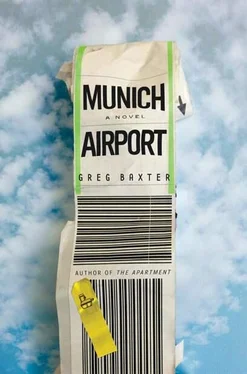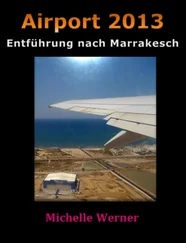Greg Baxter - Munich Airport
Здесь есть возможность читать онлайн «Greg Baxter - Munich Airport» весь текст электронной книги совершенно бесплатно (целиком полную версию без сокращений). В некоторых случаях можно слушать аудио, скачать через торрент в формате fb2 и присутствует краткое содержание. Год выпуска: 2015, Издательство: Twelve, Жанр: Современная проза, на английском языке. Описание произведения, (предисловие) а так же отзывы посетителей доступны на портале библиотеки ЛибКат.
- Название:Munich Airport
- Автор:
- Издательство:Twelve
- Жанр:
- Год:2015
- ISBN:нет данных
- Рейтинг книги:4 / 5. Голосов: 1
-
Избранное:Добавить в избранное
- Отзывы:
-
Ваша оценка:
- 80
- 1
- 2
- 3
- 4
- 5
Munich Airport: краткое содержание, описание и аннотация
Предлагаем к чтению аннотацию, описание, краткое содержание или предисловие (зависит от того, что написал сам автор книги «Munich Airport»). Если вы не нашли необходимую информацию о книге — напишите в комментариях, мы постараемся отыскать её.
Greg Baxter's bold, mesmeric novel tells the story of these three people over the course of three weeks, as they wait for Miriam's body to be released, grieve over her incomprehensible death, and try to possess a share of her suffering — and her yearning and grace.
MUNICH AIRPORT is a novel for our time, a work of richness, gravity, and dark humor. Following his acclaimed American debut, MUNICH AIRPORT marks the establishment of Greg Baxter as an important new voice in literature — one who has already drawn comparisons to masters such as Kafka, Camus, Bernhard, and Murakami.
Munich Airport — читать онлайн бесплатно полную книгу (весь текст) целиком
Ниже представлен текст книги, разбитый по страницам. Система сохранения места последней прочитанной страницы, позволяет с удобством читать онлайн бесплатно книгу «Munich Airport», без необходимости каждый раз заново искать на чём Вы остановились. Поставьте закладку, и сможете в любой момент перейти на страницу, на которой закончили чтение.
Интервал:
Закладка:
Here, in the north, he said, the Germans placed their best fighting force in the west, the 6th Panzer Army. The fighting ranged from here, at the northern shoulder, to Bastogne in the south, and also Luxembourg. The Germans made the biggest inroads through the center, through the town of St. Vith. And, he said, I believe St. Vith was where my father was killed. Or Malmedy.
You never speak about your father, I said.
I didn’t know him well enough to form an opinion, he said.
You must have some recollection.
Some, he said.
Was he intelligent?
He was a doctor.
Was he kind?
To me? I don’t think he was anything to me. He was violent with my mother.
Violent? Physically violent?
With my mother, yes. Consequently, as a sign of respect to her, I never put much effort into him. I looked him up, but when I thought I was getting close to the answer, I halted, I put away everything and gave it no more thought.
It’s hard to believe, I said.
Is it? Why?
I was in no mood to quarrel. My father was obviously having a strange reaction to his proximity to the deathplace of his father, and I found it annoying because it was so predictable. I said, I just meant that it is not easy to think about her getting beat up by her husband. She seemed like a strong woman, a warrior, she got you all the way to the US. I still don’t know how she accomplished that. Neither you nor she ever spoke of it.
Well, he said, you never asked.
Bullshit, I said. I’m not supposed to have to ask.
He tried to get the waitress’s attention. I wasn’t sure if he had or not, because I was staring at him, waiting for an answer. He waited for a moment, looking at his hands in his lap. Then he said, Mother had a wealthy friend in America, in California. A friend from school had moved there after the war to marry an American soldier, and he was wealthy, he sent money to my mother and two other women to come to California. The others never went. I don’t know what happened to them. I convinced Mother to go. She was very frail and depressed. She was so hopeless that at times it seemed that she would have preferred if I’d taken the money and gone alone. She also hated the idea of leaving Germany, leaving her own mother, heading into the unknown without a husband, even one as brutal as my father, and there were many times she nearly gave up, she often sat on some steps or the side of a road and wouldn’t speak. The journey involved many grueling hours together. There were days I had to shout at her. I struck her once and she struck me back, she beat me severely. So this is probably why we never told you about it.
The waitress came by with the check and he paid, stood, and suggested we get back on the road. He’d put both of us in a gloomy mood. But it was such a nice day that once we got back in the car and found ourselves driving up the high winding roads out of the Ruhr valley, in blazing and redemptive sunshine, we forgot about it all, we forgot about the hardship he and his mother had faced, and we forgot all about the people whose destinies had come through the crucible of that hardship, and my father said, As you may or may not know, St. Vith’s liberation is one of the most famous of all of World War Two, in part because of the prayer General Patton had drawn up, in which he asked the Lord for clear skies to bomb the Germans. Then my father spoke a little bit about the place, and about the fighting there. The word liberation called to mind, for me, girls in skirts and scarves throwing tulips at tanks and jeeps, even though I knew, from my father, that the town had been reduced to rubble by Allied bombing, so there had been no girls to wear skirts and scarves, nor a single, solitary tulip. I expected several monuments to the Allied soldiers who had died, as well as tasteless living memorials like a souvenir shop with tanks that shoot sparks, and a bar called Uncle Sam’s, where the photographs of all the Americans who had come to visit since were hung on walls, and where every night at closing they played Springsteen. We did find small memorials to those who fought and died in and around St. Vith, and they were tasteful if incongruous with the complete lack of spirituality — lack of ghostliness is perhaps a better way to put it — one felt in St. Vith. But there were no American bars and no souvenir shops. On the way to St. Vith, we had come through Malmedy. Malmedy is set inside the mountains, and the center of the town is full of narrow and winding streets that rise and fall sharply. It is charming, and one can easily imagine the fighting that must have taken place there, building by building, nightmarish, bloody. St. Vith was nothing like Malmedy. St. Vith was unsightly and sterile. It had the character of a satellite suburb, a lot like Kesternich, in fact, or the shopping complex outside Kesternich. My father relished the ordinariness of the place. He was glad it was an anticlimax. The town stretched pointlessly along the artery roads in and out, the way American towns and cities do, for miles and miles. Perhaps it had been more like Malmedy before the war. I never saw any pictures, but a woman working in the tourist office there assured us that the prewar St. Vith looked nothing like the present version. We asked for information about the war, about what the place might have looked like, what it might have been like to fight here, and she said there wasn’t any at the tourist office. It was mostly information on beer, wine, food, hiking, wellness, restaurants, and shopping. She told us to go meet a local historian. His name was Klaus Klauser. She gave us a map with some information, and she marked Klauser’s museum on it. On top of the map, in four languages, it read, St. Vith is worth a trip! The woman spoke German. Everyone in the area spoke German, even though we were in Belgium, and nobody seemed to speak English particularly well. The Museum of History in St. Vith — where Klauser worked, and where he acted as head of the local historical society — had a library of about ten thousand books and something like fifty thousand documents, records, and reports, the woman said. And the current exhibition, she said, was about life under the Nazi occupation of St. Vith. If there was ever going to be a place and time for my father to confirm his father’s place of death, it was that day. The woman told us that Klauser would no doubt love to talk for hours on the subject. He was such a lovely man, such a lovely, lovely man. She became almost watery-eyed, thinking of his loveliness. I said, We’ll go, definitely, and we’ll say hello from you. My father wasn’t sure. Local historians, he said, there’s something creepy about them. Something very creepy. And he was right. We walked to the museum. It was down a hill, past the church, through a vast parking lot, and in a big green field. It was in the old railway station. The walk took five minutes, and my father walked the whole way with his hands in his pockets. Bad idea, he kept saying, this is a bad idea.
I wonder if we looked official and menacing, like inspectors out of Kafka, because the woman at the museum’s front desk almost hyperventilated when I told her we were there to see Klaus Klauser. She didn’t even ask our names. She just turned red, started sweating, and ran to a nearby door and knocked on it. Her reaction was so strange that as she was running from us, I looked at my father and said, That was weird. He shrugged and said, Creepy, creepy places, creepy people. The desk attendant disappeared behind the door. A few seconds later, a team of men appeared. My father sighed. He even rubbed his temples. Herr Klauser? I asked. The man in the middle, wearing wire-rimmed glasses and with clipped-short brown-gray hair, nodded. I told Klauser that the woman at the tourist office had sent us. I apologized for having to speak English, but then I spoke German. I attempted to make a joke about how much the woman there seemed to like him, and either my German made a mess of it, or he, and his entourage, were not amused. If it had just been Klauser, by himself, in an office, my father and I might have sat, relaxed, and simply started talking. But the way we’d been surrounded in this tiny museum, a museum with no visitors, just local historians and administrative staff, created the tense atmosphere of a standoff. They demanded, presumably, to know what it was we wanted, why we had come unannounced, and how it was that we knew to ask for Klauser. Our explanation about the woman at the tourist office, for whatever reason, had been collectively rejected. It was sort of dizzying. The only answer I could give them that was mostly true was that we had come for no reason, we were just passing through, we were just looking for a chat, possibly a coffee or a beer. In my mind, local historians were supposed to be the kind of people who could be relied upon to drop whatever they were doing and go have a beer with visitors. I don’t think my father wanted to know about his father. And I didn’t feel I had the right to ask on his behalf, nor did I want to say, in front of everybody, that my father lost his father, a Nazi officer, most likely, in the battle for this town, especially at a time when the wounds of occupation had been opened by the exhibition. I had no answer for him, so I said, Well, I’m writing a book about the area, a travel book, nothing serious, and I wondered if you could tell me a bit about the fighting here. The men around Klauser dispersed, mumbling. Klauser seemed to be busy. There wasn’t going to be a relaxed chat. My father said, Let’s get out of here. But Klauser said, I may have something for you. He walked us through the door to the library, which doubled as the museum office. There was a large rectangular table where the men around Klauser had sat back down. Behind the table were several dozen shelves, going back a long way, full of books. Klauser disappeared in the shelves for a minute, and we stood over the men at the table, who glowered at us. Then Klauser returned with two huge books. This is all we have in English, he said. Each was a foot tall, or more, and a couple thousand pages long, in tiny type, though with lots of pictures. Have a seat, he said. Take as long as you like. I was too embarrassed to admit I didn’t want to do any actual work, that even if I were here for important research, I’d have preferred him to boil it down for me, as though I was a general or a CEO who doesn’t have time for details. My father sat down because he needed some rest, but then he opened his volume and pretended to look at it. Klauser suggested to everyone else in the room that they get back to the budget meeting they were having. They did. A woman came up to us and said, in perfect English, If you’d like anything copied, please let me know. My father asked, Is there a good place to get pizza around here? The woman started to answer him, but Klauser put his finger to his lips and made the following noise— shhhhhhhhhhhh . My father leaned back. He was acting like a bold child in school. He started making drop drop drop noises by flicking his finger against his cheek. He picked up a pencil and tried to balance it, upright, on the tip of his finger. It kept falling on the table. He was ignored. I flipped through my book, politely. I waited exactly five minutes. Then I asked the woman to copy three pages of the book for me. This turned out to be an ordeal, an ink cartridge had to be replaced, and Klauser had to halt the meeting again to open the supplies cabinet. He was furious with the woman. She was mortified and apologetic to us, and she shouted back at Klauser. As we left, I thanked the men for letting us interrupt their meeting. They smiled and said it was their pleasure, and they hoped we’d found some useful information for the book! Send us all copies! they said. Klauser stood up and shook my hand heartily, as though we had gone for that beer. He had a brochure with him, and he gave it to me. He said, This museum might be more suited to you — the Musée National d’Histoire Militaire, or the National Military History Museum, in Diekirch, Luxembourg. My father walked out of the room. I said, Herr Klauser, my father is also a historian. Or he was.
Читать дальшеИнтервал:
Закладка:
Похожие книги на «Munich Airport»
Представляем Вашему вниманию похожие книги на «Munich Airport» списком для выбора. Мы отобрали схожую по названию и смыслу литературу в надежде предоставить читателям больше вариантов отыскать новые, интересные, ещё непрочитанные произведения.
Обсуждение, отзывы о книге «Munich Airport» и просто собственные мнения читателей. Оставьте ваши комментарии, напишите, что Вы думаете о произведении, его смысле или главных героях. Укажите что конкретно понравилось, а что нет, и почему Вы так считаете.











